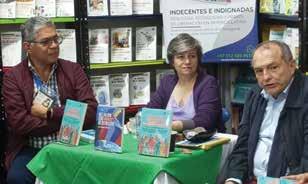




2024.cwmassembly.org
Assembly Welcome Letter from the United Congregational Church of Southern Africa
On behalf of the United Congregational Church of Southern Africa (UCCSA) and the churches of the Africa Region, it is my great pleasure to extend a warm and heartfelt welcome to each one of you as we gather for this significant Assembly.
We are honoured to be one of the hosting churches, and we embrace the theme of this Assembly, “Rise to Life: Together in Transformation” which resonates deeply within our hearts and the UCCSA Assembly theme, “Reaching Frontiers: Hope and Healing”.
The UCCSA theme encapsulates our collective desire to venture beyond the boundaries that restrict us, both geographically and spiritually. It calls us to embark on a transformative journey, seeking hope and healing for ourselves, our communities, and our world. It is a call to rise to life together in transformation, recognizing that our shared efforts can bring about lasting change and renewal.
As we gather here, we want you, our esteemed delegates, to feel the warmth and hospitality that Africa has to offer. Africa, with its rich cultural heritage, diverse landscapes, and vibrant spirituality, is a continent that embraces its visitors with open arms. We invite you to immerse yourselves in the beauty of our traditions, the warmth of our people, and the powerful spirit of Ubuntu, which reminds us of our interconnectedness and shared humanity.
We pray for the blessings and fruitful deliberations of this Assembly, knowing that together, we have the power to shape the future of our churches and communities. May this gathering be a space of deep reflection, honest dialogue, and transformative encounters. May it be a
time of building bridges, fostering unity, and seeking justice for all.
To the Assembly Planning Group and members of the Assembly Local Organising Committee, we express our gratitude for your dedication and hard work in making this Assembly possible. Your tireless efforts have created a platform for us to come together, exchange ideas, and strengthen our bond as members of the Body of Christ.
Once again, a warm welcome to each one of you. May this Assembly be a source of inspiration, renewal, and empowerment as we join hands and hearts in pursuit of hope, healing, and transformation.
Greetings and blessings,

Rev. Kudzani SBM Ndebele General Secretary UCCSA
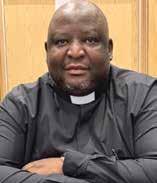


The United Congregational Church of Southern Africa (UCCSA) and the Uniting Presbyterian Church in Southern Africa (UPCSA) graciously welcomed the honour of hosting the 2024 General Assembly on behalf of all the CWM member Churches in Africa.
It is a pleasure for the UPCSA, working with the UCCSA, to welcome the CWM members and the guests of the Assembly to Africa, South Africa, KwaZulu Natal, and Durban.
The UPCSA is proud to be a member of the CWM, a prestigious organisation which, as per its vision seeks to establish “Life-flourishing Communities, living out of God’s promise of a New Heaven and a New Earth”. The CWM, as per its mission, is “Called in Christ to radical and prophetic discipleship, working in partnership with churches and the ecumenical community to resist life-denying systems, affirm peace, do justice, and enable life-flourishing communities.”
The UPCSA, collaborating with the UCCSA, will endeavour to establish an environment in which the theme of the 2024 Assembly “Rise to Life: Together in Transformation” will be fully expressed and implemented. The UPCSA prays that the holding of the CWM Assembly in Africa and in South Africa will bring about the freshness of life and serve as a call to the Africans to “Rise to Life” and work “Together in Transformation”. The continent and the country face many life-denying issues. It is our prayer that the prophetic utterances that will come from the Assembly will go a long way in challenging the vices of our time.
The theme of the Assembly is consonant with the theme of the Moderator of the UPCSA General Assembly who is also the CWM Moderator, “Stronger Together”.
The UPCSA embarks on this task of hosting the Assembly under this theme emboldened by its vision, “To be a reconciled of Christians exercising a prophetic witness to Christ”.
With its 15 Presbyteries in South Africa (three in KwaZulu Natal, three in Zambia, one in the Democratic Republic of the Congo, and one in Zimbabwe), the UPCSA welcomes you to enjoy the African spirit of Ubuntu and spiritualities.
Come, let us share life and love together.
Yours sincerely,
 Dr Lungile Mpetsheni General Secretary UPCSA
Dr Lungile Mpetsheni General Secretary UPCSA
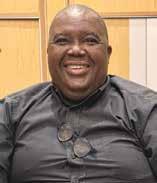


In the vibrant city of Durban, South Africa, the United Congregational Church of Southern Africa (UCCSA) and the Uniting Presbyterian Church in Southern Africa (UPCSA) are set to host a significant event in the ecumenical calendar of the Council for World Mission (CWM) – the CWM Assembly 2024.
This gathering, themed “Rise to Life: Together for Transformation,” is not just a meeting of minds but a confluence of faith, hope, and the relentless pursuit of transformation in a world riddled with pain, greed, competition, and injustice.
The UCCSA and UPCSA are jointly hosting the Assembly on behalf of other member churches in Africa.
The United Church of Zambia which is a large protestant church in Zambia; the Church of Jesus Christ in Madagascar that spans over a large geographical space and ministers to huge population and the Churches of Christ in Malawi all share principles of the reformed traditions, are members of the Council for World Mission.
Together with UCCSA and UPCSA, these churches are privileged to participate in the mission of God in the context of Africa alongside other church denominations of diverse traditions.
As the continent prepares to welcome delegates from around the globe, it does so against a backdrop of formidable contextual challenges.
Africa is plagued with a number of critical challenges such as the ongoing war in Sudan that has incapacitated communities, leaving a trail of suffering, death and displacement. The war in Democratic Republic of Congo, where UPCSA extends her ministry and mission has also negatively impacted the lives of thousands of people, both young and old. The same can be said about the sporadic incidents of violence due to the insurgency in Mozambique where UCCSA extends her mission and ministry.
In her quest to reach new frontiers, UCCSA has begun her mission in Malawi where she is extending her mission to the communities and people of
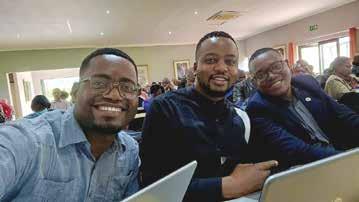
Malawi. UCCSA has also provisionally accepted the Evangelical Congregational Church of Angola into full membership with the hope that this denomination will be fully integrated by the 42nd Assembly that will take place in October 2024.
These countries are still nursing the wounds of war, pain, and trauma of the trans-Indian slavery. The visible scars can be seen in the infrastructure and the quality of life that people are living.
The sub-continent, as the rest of Africa and the world, is in the phase of rebuilding post COVID-19, where churches witnessed a decline of membership as people lost their lives and livelihoods. UCCSA and UPCSA find themselves ministering in such a context. The COVID-19 pandemic was a wakeup call that Africa must address health disparities and strengthen her
As one enumerates the challenges of the subcontinent, they may not ignore the emergent crises of rising sea levels, extreme weather events, and resource scarcity that together pose significant challenges to mother earth.
This is more pronounced and keeps recurring in the KwaZulu Natal region where the CWM Assembly will be taking place. The shores of Durban have witnessed unprecedented floods and destruction of lives and property. In many ways, the people of God are left wondering as to the meaning of faith in this context. The same floods have extended to Mozambique and Malawi where they have left a trail of destruction. Thanks to ecumenical solidarity that has enabled the Church to carry out disaster relief ministry. These disastrous floods in Mozambique and Durban highlight the urgent need for environmental sustainability efforts and the eco-ministry of the Church amongst other interventions.
Having enumerated some of the challenges, the Church is alive in Africa and in this case, in southern Africa as epitomised in the preparatory role, that has been done towards the hosting of the CWM Assembly.
The roots of Christianity in South Africa run deep, shaped by historical events and diverse denominations. Today, South Africa’s churches reflect diversity, unity, and a rich spiritual heritage.
Both UCCSA and UPCSA have their headquarters in South Africa covering the breadth and width of the
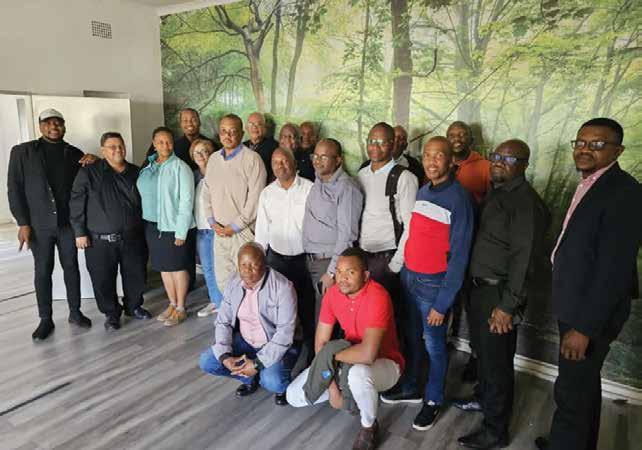


the Kairos moments that God continues to unfold before them, the UCCSA is marching on with the theme: “Reaching new frontier; hope and healing” and the UPCSA is aiming at the imperative of unity and reconciliation with the theme: “stronger together”.
The church in South Africa finds herself ministering in the most unequal society. If one would visit different congregations, one disturbing trend to note will be the gap that exists between suburbs and township congregations, between urban and rural congregations. This is the legacy of apartheid that disrupted cultural growth and created an unbridgeable gap between beneficiaries and victims. This inequality demands continuous deliberation, empowerment, and healing. As such, liberation theology and healing ministries are at the heart of mission.
The CWM Assembly is being hosted in Durban. A city that embodies spirituality and cultural diversity where the warm Indian Ocean meets golden shores.
Durban’s churches, including the Groote Kerk (Great Church), stand as architectural landmarks, reflecting faith and history. The city’s spiritual landscape provides a serene context for the transformative agenda of the CWM Assembly. It was in 1912 that Isililo Samabandla was established which led to different women ministry in church denominations. This is the land of Kings and Queens, who uphold the cultural heritage of KwaZulu Natal.
In conclusion, the 2024 CWM Assembly in Durban is more than an event. In a way it answers the question “where is God?” by replying: “in the suffering of His people”. This has been physically demonstrated by the CWM by choosing Africa and particularly Durban as its venue. This act goes further to affirm the potential of the African people and the Church to carry the torch of full liberation and the project of decoloniality in search for transformation.
This will indeed provide strength for Africa to rise together and face its challenges head-on, drawing strength from its rich heritage, solidarity with the ecumenical Church, and its spirituality as it preaches the message of the fullness of life in Christ.
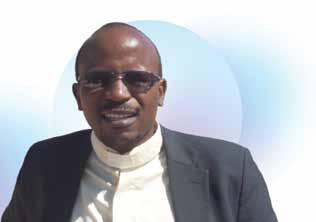
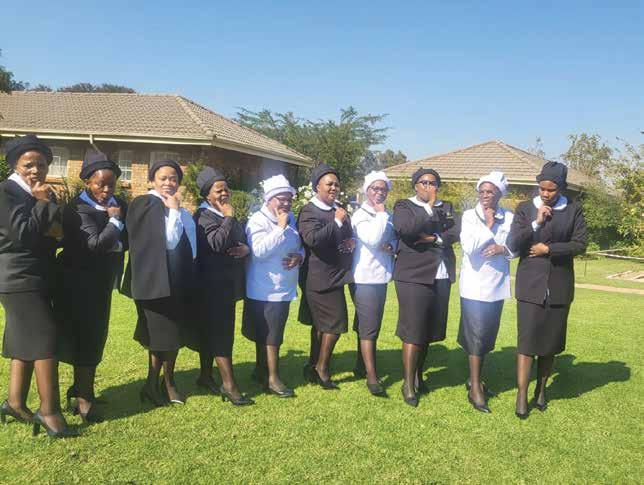
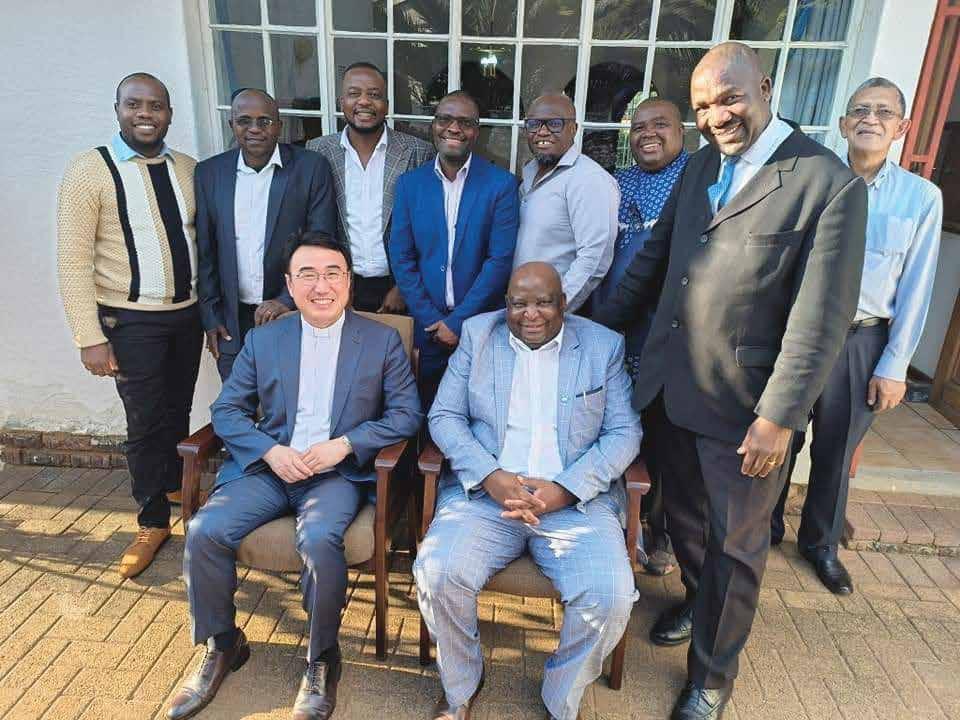
The Local Organizing Committee (LOC) for the Council for World Mission (CWM) Assembly 2024 has been working diligently to ensure the success of this important event. The CWM Assembly will be held in Durban, South Africa from 12-19 June 2024, marking the first time the city will be hosting this global gathering.
The LOC is chaired by Rev. Kudzani Ndebele, the General Secretary of the United Congregational Church of Southern Africa (UCCSA), and Rev. Lungile Mpesheni, the General Secretary of the Uniting Presbyterian Church in Southern Africa (UPCSA), serves as the Secretary. Both serve as members of Assembly Planning Group (APG) convened by Rev. Wellington Mthobisi Sibanda. The committee includes representatives from both the UCCSA and UPCSA and the Assembly Coordinator, Miss Zimbili Sibisi, is part of the LOC.
A CWM meeting on 10 August 2023 proposed that a site visit be conducted to inspect potential hotel facilities and logistics for the upcoming CWM Assembly meeting. A delegation was formed to carry out this inspection.
The delegation consists of the CWM Deputy Secretary Dr Sudipta Singh, UCCSA General Secretary, and UPCSA General Secretary, the Mission Secretary for Social Justice, Rev. Dr Sindiso Jele, Rev. Wellington Mthobisi Sibanda, and Miss Zimbili Sibisi.
The delegation visited six hotels in the Durban and Umhlanga areas, evaluating them based on key criteria such as conference facility capacity, availability of breakaway rooms, boardrooms, number of rooms, and security. The hotels inspected were:

•
•
•
•


• The Capital Zimbali Resort
• AHA Hotel – Umhlanga
After the site visits and evaluations, the panel unanimously preferred the Umhlanga area for several reasons:
a) High security visibility and low crime rates in the area
b) The hotels are within walking distance of each other, allowing for overflow accommodation
c) Proximity to the newly built Oceans Mall
d) Access to a safe beach area for activities
e) Variety of restaurants catering to diverse dietary needs
The CWM LOC embarked on a collaborative and multifaceted preparation process for the upcoming Assembly meeting. This involved a series of both inperson and virtual meetings.
From the start, the team worked to establish clear roles and responsibilities, pairing up members to tackle different aspects of the planning. They carefully crafted their terms of reference, outlining the objectives, scope, and timelines for this critical endeavour.
While the journey has certainly been challenging, the LOC team relished the opportunity to come together and leverage their collective expertise. Through productive discussions, creative brainstorming, and diligent execution, they have meticulously planned every facet of the event - from the venue selection documented in the hotel inspection report, to the broader logistical considerations. This inclusive, well-structured approach has been instrumental in ensuring a seamless and impactful Assembly meeting that will further the CWM’s important mission.
During their meetings, the LOC has discussed and prepared for various aspects of the Assembly, including Communication and Travel Arrangements. The committee has been working hard to ensure smooth
travel logistics for all delegates, including coordinating airport transfers and local transportation.
The Assembly Coordinator provided always gave a summary of updates and action points from the Singapore Office, including any progress reports and reminders on pending tasks.
In the latest meeting, the CWM Assembly organisers provided an update on the progress made in the communications and publicity workstream. It was noted that the team has successfully engaged with a vendor for the corporate gifts that will be distributed to delegates.
To oversee the storage and management of these gifts, the organisers have enlisted the help of Rev. Michelle Black, who has graciously offered to use her church as a storage facility. Rev. Michelle has been instrumental in helping us find reliable local vendors and secure a space to house the Assembly materials.
The team has finalised the printing arrangements for 600 three-coloured t-shirts that will be part of the event branding and attire for participants.
Rev. Wellington, who oversees printing, stage and lighting, and the exhibition, has been working closely with Rev. Black and the local team to ensure a seamless execution of these critical elements.
The communication team is also working diligently to coordinate with all the vendors involved, ensuring the timely delivery of the required items.
“We are grateful for the support and expertise of Rev. Michelle and Rev. Wellington, whose contributions have been invaluable in propelling our publicity efforts forward,” reported the Assembly Coordinator.
The meeting noted that there will also be an exhibition booth for the LOC.
The Johannesburg Transit Team led by the Rev. Betram Swartz expressed their readiness to welcome the guests. The transit team will be in event-themed t-shirts and event welcome banners will be set up for visibility. A detailed list of transit delays will be provided separately for thorough planning.
The LOC has appointed within its ranks the Safety and Security committee headed by Rev. S.K. Dlamini. Rev. Dlamini is also a Chaplain in the South African
National Defence Force, thus making him an ideal goto person for security-related matters.
He is, however, not the only member who will be serving in this committee, other members with experience in security will form part of the team looking into matters of safety of our delegates.
The Committee on Safety and Security’s responsibilities include, but are not limited to, the safety of the members attending the Assembly in all areas of the assembly, especially outside the main venue of the Assembly, the movements to and from the airport. Members on arrival will receive briefings on safety rules to be adhered to during their stay in Durban.
We are committed to ensuring a safe Assembly, working together with public and private security agencies, departments, and companies that all necessary safety and security measures are applied. We hope that the delegates will also work with us in ensuring their safety during their stay in the city. A working detailed plan on safety and security has been tabled before the relevant structures of the CWM and ad-hoc structures to ensure the highest levels of safety and security possible.
The LOC has arranged for nutritious and culturally appropriate meals to be provided throughout the Assembly.
Plans are in place to have adequate medical and healthcare services available to cater to the needs of the delegates.
Rev. Thandi Mwelase and Rev. Thabani Masikane, members of the Spiritual Life and Worship Group, are responsible for organizing meaningful worship experiences and spiritual activities during the Assembly.
We have managed to hold few prayer sessions prior to the Assembly. The LOC has been working to build a strong sense of community and unity between the UCCSA and UPCSA. On 1 May, Workers’ Day in South Africa, the two churches came together for a joint prayer session attended by around 100 participants. This was the first of three such sessions leading up to the CWM Assembly.
The session was opened with a prayer by Rev. Zungu, Moderator of the UPCSA in Durban, and Rev. Mthobisi Wellington Sibanda, LOC Convener, introduced the members of the committee. UCCSA-KZN Regional Chairperson, Dr Nhassengo, and UPCSA Session Clerk, Aaron Nhlabathi delivered introductory speeches, setting the tone for the day’s activities.
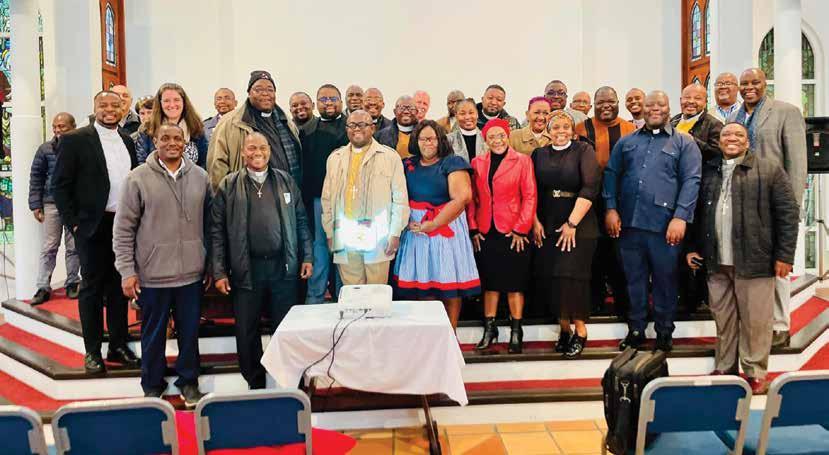


Rev. S.R. Sokhela delivered a powerful message from the book of Ezekiel, highlighting the themes of abundance, restoration, and healing that the CWM Assembly hopes to bring to the African continent.
He emphasised the significance of the event in the face of challenges such as droughts, floods, and the tensions surrounding the upcoming elections. The presence of youth representatives at the session will inject an atmosphere of excitement and hope, as they share plans for a joint celebration on 16 June, commemorating the historic youth uprising at the Olive Venue.
The LOC members, including Mrs Ningi Ngcobo and Mrs Valmai du Toit, expressed their gratitude for the fruitful prayer session and the importance of unity and collective action in bringing about transformation and healing within the churches and the wider African context. As the UCCSA and UPCSA prepare to host the CWM Assembly, their commitment to unity, prayer, and collaborative efforts continues to shine as a beacon of hope for the region. Through their shared vision and dedication, they aim to be a catalyst for life, healing, and renewal, inspiring positive change across Africa.
The next joint prayer session will take place at the “Soldiers of Christ Conference” in Inanda Congregational Church, further strengthening the bond between the two churches and their shared mission.
Key Assembly priorities and challenges for the LOC
Ensuring robust accessibility and inclusion
A major priority for the LOC is making the CWM Assembly as accessible and inclusive as possible. This includes providing multilingual translation services, captioning and sign language interpretation, and ensuring the venue and materials are fully accessible to participants with disabilities. The LOC is working closely with the CWM organizers and local partners to identify and address any potential barriers to participation.
Facilitating seamless hybrid participation
Given the ongoing impacts of the COVID-19 pandemic, the CWM Assembly will be hosted in
LOC MEMbErS:
• Rev. Kudzani Ndebele General Secretary of UCCSA, Chairperson
• Rev. Lungile Mpesheni: General Secretary of UPCSA, Secretary
• Ms Patience Zimbili Sibisi CWM Assembly Coordinator
• Rev. Mthobisi Wellington Sibanda LOC Convenor and Assembly Communications Working Group Member
• Rev. Michelle Black: LOC Communications Member
• Rev. Thandi Mwelase: Spiritual Life and Worship Group Member
• Rev. Thabani Masikane: Spiritual Life and Worship Group Member
• Mr Theophilius Doc Nasshengo Protocol and Transport
• Mr Aaron Nhlabathi Protocol and Transport
• Mrs Ningi Ngcobo: Culture and Emersion Visit Member
• Rev. Betram Swartz: Johannesburg Travel Logistics and Protocol
• Rev. Sandile Dlamini: Safety and Security
• Mrs Valmai Du Toit Administration and Logistics
• Rev. Sibusiso Gwala Administration and Logistics
• Rev. Sandile Sokhela Protocol Member for King of the Zulu Nation
a hybrid format, with both in-person and virtual attendance options. The LOC is focused on ensuring the virtual participation experience is smooth and engaging, with reliable video conferencing, content sharing, and interactive features. Co-ordinating the logistics of hybrid participation is a significant challenge.
Curating diverse and inclusive programming
The LOC is collaborating with the CWM organizers to develop a programme that reflects the breadth of perspectives and experiences within the cultural heritage sector. This includes elevating the voices and expertise of underrepresented communities, providing platforms for global south institutions, and featuring cutting-edge topics and innovative approaches.
Promoting Post-Assembly Action and Impact
Beyond the event itself, the LOC is focused on ensuring the discussions, outputs, and commitments from the CWM Assembly translate into tangible actions and long-term impact. This includes developing strategies to disseminate outcomes, facilitate ongoing collaboration, and track progress on key initiatives.
In the book of Jeremiah, God asked the prophet Jeremiah, “What do you see, Jeremiah?”
The prophet responded, “I see the branch of an almond tree.”
“You have seen correctly. You have listened well because I have been watching you to see that my word has been fulfilled,” replied God.
At the second time when the same question was asked, Jeremiah responded, “I see a pot that is boiling. It is tilting toward us from the north,” replied Jeremiah. Then God declares what will happen henceforth from verses 14 to 16.
“Jeremiah, Jeremiah, what do you see?”
That is a singular question that God poses to those claiming any prophetic heritage in the four countries in which the UPCSA has its existence and the five countries in which the UCCSA operates. But the work is threatened when one looks at “the North”.
The [global] North has always been a socio-ethical problem, a total religio-cultural catastrophe, a real and present economic danger since the days of slavery, and colonisation, and apartheid and now globalisation. The north represents a very bad taste in the mouth of an African, a bad omen to the oppressed and excluded, a curse to the those who have historically been relegated to racial inferiority sub-humanity.
“Jeremiah, Jeremiah, Jeremiah, what do you see?”
I see churches moving away from ecumenical cooperation and suddenly but are increasingly looking inwardly and putting their proverbial heads in the sand like an ostrich. I see brazen corruption from political leaders who have embraced performance mediocrity in their respective countries. The list of thuggery and theft is endless.
“Jeremiah, Jeremiah, Jeremiah, Jeremiah, what do you see?”
Lord, I see Africa trading with its children through human trafficking across the nations. I see many political assassinations and murders, and the fights for internal control of political parties at any cost.
I see diamond, tribal, and border wars within Africa and within Europe and within the Middle East, wars that have claimed innocent lives of women and children. I see people greedy for control of the wealth, the minerals, the land, the rivers, the forests, the rivers, and many other common goods that have been commodified.
Lord, I see extremely high levels of unemployment and abject poverty, with hundreds of thousands sitting idly at home including thousands and thousands of graduates who have not been absorbed into the job market. I see syndicates and mafias running governments and state-owned enterprises and in the process emptying the fiscus within the different government.
The relevance of our mission and ministry in today’s globalised world, in Southern Africa where we are existentially and ontologically present, in Africa where we belong and our identity African not because we were born in Africa but because Africa was born in us.
Our contextual relevance will be determined by our response to this existential question, “Jeremiah, Jeremiah, Jeremiah, Jeremiah – what do you see?”
We cannot therefore be blind to what is happening in our countries and churches. We cannot be blind to incidents of gender-based violence right within the church and within families of the clergy within our churches. We cannot look aside and claim that we are blind to the violation of women and children and elderly within our community.


No, we cannot be blind towards blatant and subtle racism and racial differentiation within our churches, countries, and communities. We cannot be blind to moral degeneration and moral decay with healthy families paying the price otherwise.
“Jeremiah, Jeremiah, Jeremiah, Jeremiah, Jeremiah, what do you see?”
I see the complete loss of Ubuntu – Botho, a complete round-about from what Elders taught us. Innocent life being criminalized with rampant violence in all segments of society – all races, all communities, all classes, all ages, all economic and social categories.
Lord, I see absolute lack of empathy and solidarity with those who are weak and marginalized and the commodification of faith and the commercialisation of the Gospel. There is widespread division and separation and alienation and anomie, and the ultimate price our children and their children will pay for rampant environmental degradation and the dehumanization of the family and community.
Thus, it does begin with the call to prophesy, the response to the call, the divine question of what the
prophets see wholly not selectively, the nuances of the call-and-response between God and prophet and the ultimate response from prophet to God’s pertinent question: “Jeremiah, Jeremiah – what do you see?
May we be found responding, “Lord, I see the branch of the almond tree and the boiling pot, tilted toward us from the north.”
Adapted from the CWM Devotional Homily given at the Berea United Congregational Church – Ethekwini on 31 October 2023.

Rt Rev. S.J. Mtetwa Moderator of UPCSA (2021 – 2023)

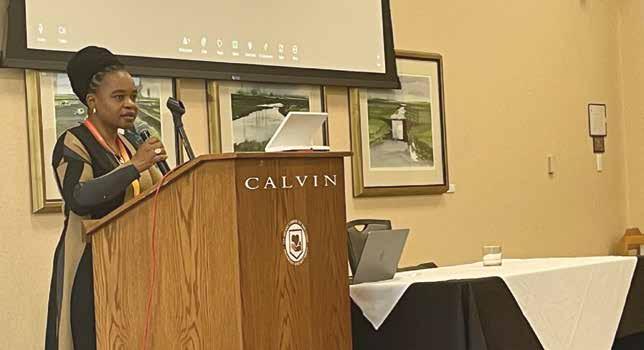
CWM Moderator Rt Rev. Lydia Neshangwe, as an ecumenical guest to the World Communion of Reformed Churches (WCRC) Executive Committee meeting, reflected on how the church is at a crossroads in a volatile and uncertain world.
The meeting was held from 18-22 May at Calvin University, Grand Rapids, Michigan, USA, where the WCRC was established in 2010.
The gathering precedes the upcoming WCRC 27th General Council that will take place on 14–23 October 2025, in Chiang Mai, Thailand, under the theme, “Persevere in Your Witness.”
The General Council serves as a platform where WCRC members come together to give regional reports, and share stories showcasing local contexts
and challenges while collectively discerning and crafting responses to global trends that create injustices and deny life.
Speaking to the gathered members of the Executive Committee, Neshangwe brought greetings from CWM. She also took the opportunity to highlight two areas of commonality between both organisations – that of operating in a “VUCA” world and the current season of preparing for their own assemblies.
reaping fruits of collaboration
“VUCA is an acronym that was coined years ago to describe that we are operating in conditions of Volatility, Uncertainty, Complexity, and Ambiguity,” explained Neshangwe.
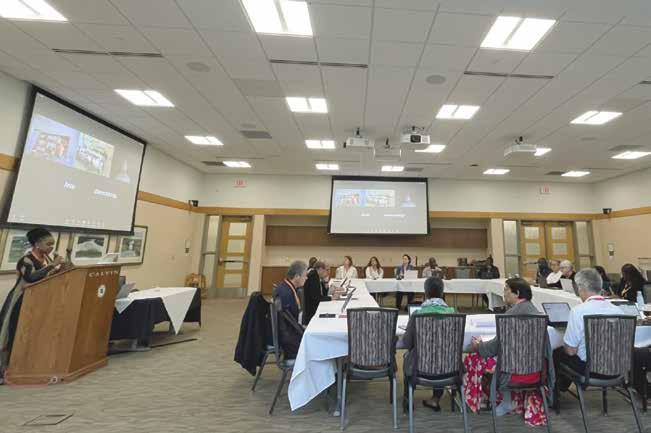
“Even though we are the church,” said Neshangwe, “the ‘Volatility’ factor of our politics and politicians is at such high levels that anything is possible, anywhere, any day, and by anyone.”
She also added that Uncertainty, Complexity, and Ambiguities brought on by the various environs of business, technology, various cultures, and religions have led to a myriad of both blessings and curses and left the church at a crossroads, unsure “as to even how to do church.”
Neshangwe applauded the decision that led CWM and WCRC to form a global partnership that illustrates the importance of integration and cooperation. The partnership between the CWM and the WCRC was cemented in a recent memorandum of understanding— one that she described as a shining example of “the benefits of collaboration and not competition.”
Neshangwe also identified the season in which both organisations find themselves—that of preparing
for their own distinctive assemblies, with CWM holding its Assembly during June in Durban, and the WCRC ramping towards its General Council next year.
“We are both in assembly mode, and we both understand the importance of bringing our members together in community,” said Neshangwe.
Expressing once again CWM’s appreciation of the friendship found in WCRC, Neshangwe proffered a heartfelt affirmation of the WCRC vision.
“CWM wishes to also remind WCRC [of its] vision of ‘Called to Communion, Committed to Justice’ and to affirm it,” declared Neshangwe.
“Not only is it a catchy vision, but also a powerful and meaningful one that should continue to drive your work and mission. May God bless this meeting of the Executive Committee and may your work produce fruit and blessings to the world around you.”



In response to the ongoing Israel-Palestine conflict, the Council for World Mission (CWM), in partnership with Dar al-Kalima University, organised its first DARE Regional Forum in the Middle East region in Istanbul, Turkey from 21-24 May.
The Regional Forum was a gathering of 28 theologians and scholars from countries including Palestine, Jordan, Lebanon, India, Sri Lanka, Korea, Mexico, Argentina, USA, and Canada.
The event fostered a robust intellectual dialogue and facilitated a meeting of minds as Palestinian and Middle Eastern scholars came alongside their international colleagues (with emphasis on academics from the Global South), to share their experiences, insights, and research on the failures of theology in the face of the war on Gaza, and the implications for the research of religion in general from a decolonial perspective.
A world where morality is in shambles
It is now clear that the war in Gaza has become a crucial litmus test for international morality and ethical standards in the 21st century. The genocidal war on Gaza has also made it abundantly clear that for the past century, the people of Palestine have been fighting not just the Zionist movement and the State of Israel, but an entrenched colonial order led initially by the former British Empire and more recently, by the United States backed by Europe.
In a statement released earlier by CWM at the onset of the Israeli military incursion into Gaza after 7 October 2023, CWM General Secretary, Rev. Dr Jooseop Keum decried the “complete blockade of Gaza [as] wilfully leading innocent people to starvation and death, [and] a crime against humanity under international law. It is nothing but a genocide of an innocent population of over one million.”
As is the tradition of DARE forums, tough questions were raised and tackled in a “no holds barred” environment as participants debated and argued over issues such as whether theologians and scholars of religion have moral duties beyond the traditional one of speaking truth to power, especially since it is evident that the powerful know the truth but choose to ignore it.
Participants also explored how the intelligentsia from the Global South can push back against a rising tide of scriptural weaponisation by Western theology, the State of Israel, extremist Islamic groups, and state entities.
Rev. Dr Mitri Raheb, Founder and President of Dar al-Kalima University, was a guest at the forum. Raheb, a celebrated academic and theologian, has penned many books over the years that attempt to shed light on the plight of the Palestinians living under apartheid conditions.
A running critique by Raheb during the forum was that “…the more biblical an organisation is anywhere in the world, the more Zionist it seems to be” – an observation that served to describe the imbalance of support between Israel and Palestine with the constant presence of “Christian Zionism” – a product of the syncretisation of Zionism and mainstream biblical interpretation – a political theology justifying the creation of modern Israel.
Conference papers and proceedings from the forum will be collected into a single volume and released in late 2024 or early 2025.
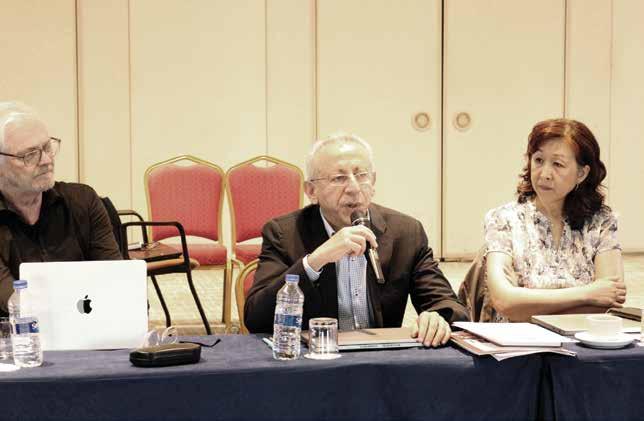


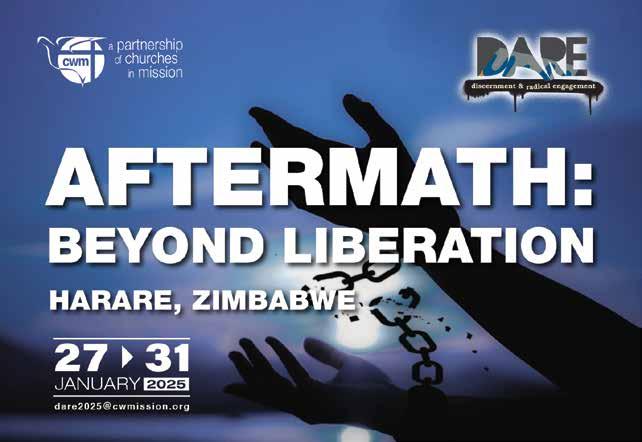
As the shackles of slavery fall away into history, the legacy of such practices endures as the modern theological world continues to grapple with the lingering impact of such a life-denying practice—an impact still supported by oppressive systems of authority such as patriarchy, empire, religion, market, caste, and prejudice, among others.
Be part of a gathering of minds as DARE 2025 invites activists, practitioners, students, and scholars to propose papers for the upcoming DARE forum entitled “Aftermath: Beyond Liberation.”
The event will be held in Harare, Zimbabwe, from 27-31 January 2025.
The CWM Discernment and Radical Engagement (DARE) forum is a radical interdisciplinary, interreligious, and affective platform that not only keeps abreast of shifts in academic trends, but also transcends those trends to root the spirit of DARE in praxes, pedagogies, and theories of struggles for liberation, decolonization, and counter-imperial testimonies.
We invite proposals for presentations in these six areas:
1. Legacies of slavery
2. Modern day slavery
3. Education for Liberation
4. Transformative Ecumenism
5. Intereligiosities, Racisms and Anti-Imperial Struggles
6. Queer Theologies and Spiritualities
To propose a presentation, please fill in the requested information on the form linked on https:// www.cwmission.org/dare-2025-issues-call-for-papersaftermath-beyond-liberation/
You may also access the form by scanning the QR code below.

Submit the completed form in MS word/doc format to dare2025@cwmisssion.org by 14 June 2024
Symposium explores Christian response to spirituality, politics, and polity

In partnership with The Institute for the Study of Culture and Christianity (Belgrade, Serbia), the Council for World Mission (CWM) organised a symposium, entitled “Spirituality, Politics, and Polities,” for theologians, political scientists, scholars, and activists.
The event, held 24 – 28 March at Vila Dinčić in Serbia, drew 15 participants comprising Orthodox theologians and practitioners from Bosnia, Croatia, Greece, Kenya, Montenegro, Russia, Serbia, and the USA as well as representatives from two ecumenical partners – the Conference of European Churches and All Africa Conference of Churches.
The symposium fostered discussions on the emancipatory potential of Orthodoxy and explored the possibilities of future joint projects.
Participants also focused on identifying aspects of the Orthodox tradition and its political theology that are
relevant to contemporary issues such as the role of the laity in the church, the role of women, the relationship between various emancipatory Orthodox theologies and liberation theology—and the need to explore all these topics in an ecumenical context.
The symposium also formed a working group of scholars to reflect not only on the mission of the church in political debates and policy formation, but to address deeper questions of Christianity and politics and polities, and the ways in which Christians can contribute to broadening the horizons of human freedom in the contemporary world.
President of The Institute for the Study of Culture and Christianity, Prof. Davor Džalto remarked, “It was a pleasure, and an intellectually very rewarding experience, to participate in the organization of the symposium as well as in actual workshops. Looking back at the discussions we had, walks, lunches, and evening talk, I have an impression that something


incredibly important for the Christian world has happened!”
Rev. Dr Graham McGeoch, CWM Mission Secretary of Discipleship and Dialogue, echoed Prof. Džalto’s view.
McGeoch stressed that the conversations during the symposium are ones that are not only important to the Orthodox but also for the Protestant context. He said, “Conversations like this open up new ways of looking at Orthodox Christianity, ecumenical dialogue, and political theology.”
As part of the ecumenical partner contingent, Katerina Pekridou, Executive Secretary for Theological Dialogue of the Conference of European Churches,
expounded on the strength of the Orthodox faith as one that possesses a potential to advocate, in constructive and self-critical ways, for a vision of a transformed, life-affirming world that promotes just, peaceful, and sustainable ways of living.
Participants departed from the five-day symposium with the knowledge that the gathering of minds fostered not just inspiring conversations and meaningful interactions, but also new perspectives and ideas to jointly implement.
The symposium was a concrete step towards recognising the need for similar events —larger and even more diverse—that will bolster and push forward already established conversations.
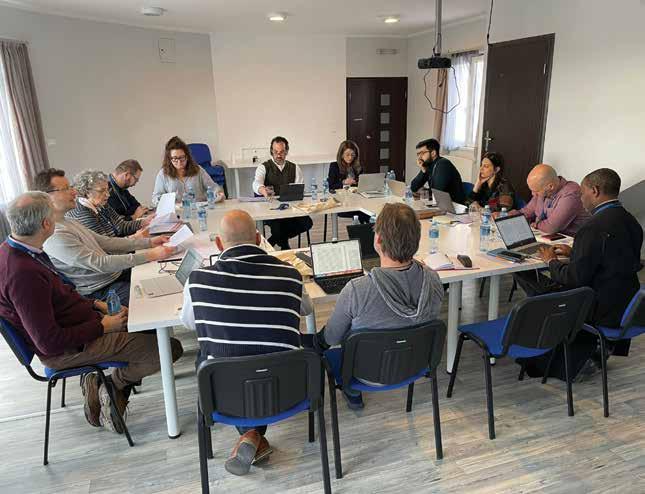
CWM Moderator to Global Christian Forum: Diversity is a blessing, not a curse
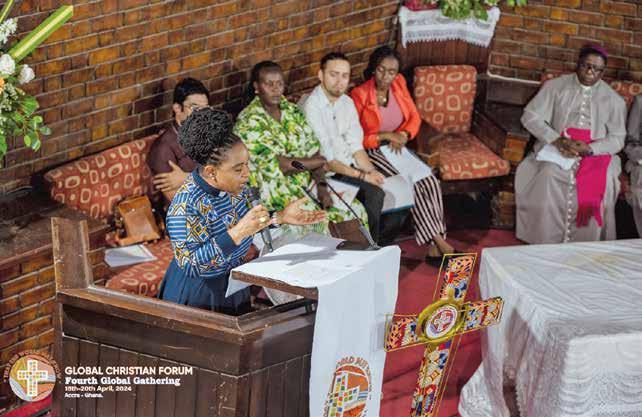
Cfor World Mission (CWM) Moderator Rt Rev. Lydia Neshangwe preached during the opening worship service of the Global Christian Forum Fourth Global Gathering in Accra Ridge Church, Ghana, Africa on 16 April.
The Global Christian Forum, marking its 25th anniversary this year, is an ecumenical platform where members of different churches and inter-church organisations across denominational, regional, national, ethnic, and cultural boundaries come together in dialogue over shared concerns, such as social and ethical questions, secularisation, or the challenges of minority status or persecution.
Two hundred forty participants from 60 countries gathered for the colourful and vibrant worship service, representing the sheer depth and diversity present in the global Christian community.
Neshangwe’s sermon tied in with the theme of the event, “That the World May Know.” She drew from Acts 13:1-3, which describes the fateful decision by the Holy Spirit to pair Barnabus with the mercurial new convert, Saul, on their first mission trip. The pair goes on to not only establish the early church but also shape Christianity in ways still relevant today.
This coupling, while extremely familiar to modernday Christians, was an utterly illogical one when viewed through the eyes of the early missionaries. The two men could not be any more different from each other as one looks at their upbringing, education, worldviews, even right down to their individual conversion experiences.
Saul was everything Barnabus was not and vice versa! The pairing looked as though it was set up to fail right from the start.



“…Barnabas and Saul are incompatible, different, and divergent in their whole beings. And the bottom line is that we are all different in our confessions, traditions, contexts, and historical backgrounds,” said Neshangwe, who reminded the audience that differences amongst the ecumenical community are still present today as they were in the first century church.
Neshangwe noted, however, that differences should not be seen as stumbling blocks towards ecumenical unity but rather believers should work together despite the differences so that the world may know the fruits of the church’s labours borne out of unlikely partnerships were from God and not from man, that “the glory will not go to us, but only to God.
“Confessional diversity is a blessing, not a curse. Cultural diversity is a blessing, not a curse,” stressed Neshangwe.
In closing, Neshangwe exhorted the audience to not allow inherent differences to divide, but to harness them to grow the mission of God in both quantity and quality, as Saul and Barnabas did.
“Let us allow our irreconcilable differences to keep us humble, a quality that is absolutely necessary for God’s mission to be achieved,” encouraged Neshangwe, “Then ‘the world may know’ that opposites will not only attract, but they will attract others to Christ.”
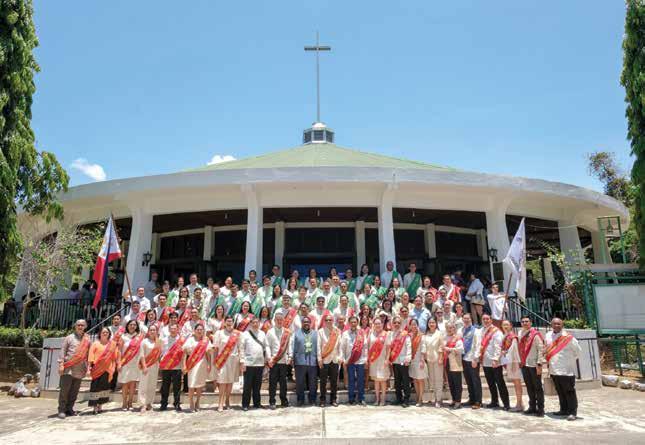
The Union Theological Seminary in the Philippines celebrated the graduation of seminary students 11-12 April.
Located in the City of Dasmariñas, Cavite, Philippines, the seminary was born from the 1907 merger between the Presbyterian Ellinwood Bible School and the Methodist Florence Nicholson Seminary.
Its alumni have led missions to the barrios, spearheaded evangelisation, and established churches in rural and urban areas while providing spiritual leadership in ecumenical circles as well as pastoral services to the Filipino people.
Council for World Mission Deputy General Secretary–Programmes, Dr Sudipta Singh, spoke at the commencement.
He highlighted that, while graduation marked the end of the students’ academic journeys, the very word “commencement” denotes the start of the next chapter in their lives—a chapter that will “have the potential to radically transform the mission and ministry of the church in the Philippines.”
Singh further revealed that although “seminary” has its roots in the word “seedbed” where young seedlings were cared for, protected, and nurtured with the goal of “… reinforcing commitment to conformity and


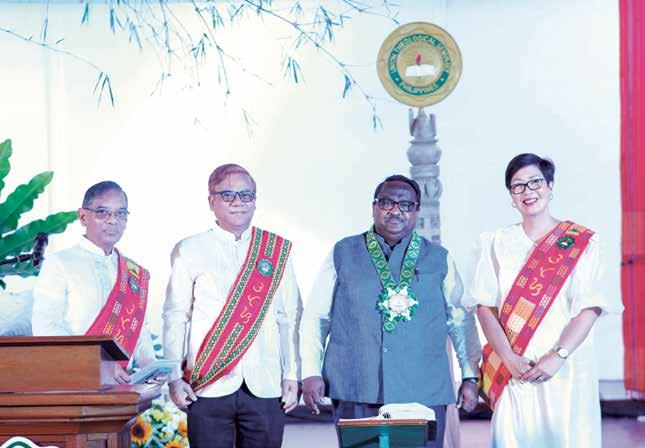
obedience to the official teaching of the church,” which Singh criticised as “a regimentation process to produce an army of men and women trained to perpetuate… the prevailing order,” he posited that Union Theological Seminary graduates are called to be something more.
With a nod towards the seminary’s unique profile and heritage, Singh identified that the graduates must be of a different stock since the seminary positions itself as a “seedbed of revolutionaries” – a greenhouse that produces countercultural fruits ready to challenge and contest all manifestations of centralised and abusive power.
“Being pastoral is profoundly political,” declared Singh. “The politics of Christian witness in the context of Empire is to resist the temptation to be co-opted by
the Empire, and the nerve to come out of the Empire. In that politics, we experience a profound spirituality.”
Singh also reminded the graduates that a faith that does not produce repentance and transformation is for naught—and a recipe for the church to fail. As the graduates go forth into the world, they must see to it that the community around them be provided the foretaste of the eschatological banquet.
“The church is not [the means to] the end, it is the wrappings that cover the Divine gift that we await with anticipation – the Reign of God,” stressed Singh, who closed with a benediction for students: “as spirit-filled disciples, may you be out of control; out of control of all unjust authorities and sinful systems and be God’s partners in turning the world upside down.”
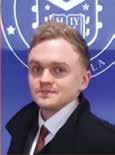
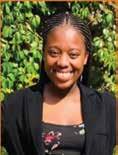
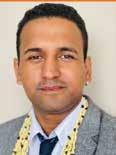

The Council for World Mission (CWM) recently welcomed two interns and a consultant, who will be deployed in the London, South Africa, and Singapore offices respectively.
The two interns, Adam Pailing, and Lethabo Renee Moloko, were selected from a pool of young hopefuls who applied for the CWM Internship Programme when the call for registrations was sounded in late 2023.
Both interns had to be first endorsed and supported by their churches and respective General Secretaries or Moderators in order to be considered for the roles. Pailing is a member of the London Road Congregational Church, UK, while Moloko worships at the Uniting Presbyterian Church in Southern Africa.
The CWM Internship Programme is a creative, hands-on, and innovative opportunity for 21-30-year-
olds to explore, for 6-12 months, faith alongside work in an international mission organization.
“As CWM has Member Churches located across six regions (Pacific, Africa, Europe, Caribbean, East Asia, South Asia) with its main office in Singapore, the internship will involve opportunities to work in one or more of these locations. This is an excellent opportunity for our youths to explore, experience, and learn from a different culture,” explained Rev. Julie Sim, CWM Mission Secretary-Mission Programme and Partnership.
Through the programme, interns expect to develop valuable new skills through cross-cultural experiences and work settings as well as being given ample opportunities to experience working with various CWM teams from Programme to Finance to Communications.



They will also receive comprehensive and practical on-the-job training as well as a close mentoring relationship throughout their tenure, ensuring wellrounded support for their professional, personal, and spiritual development.
“I have an interest in international work and cultural exchanges; this position presents an opportunity to explore that interest further and combine it with spiritual development in a way that I have not done before,” said Pailing, who previously worked as an English teacher in South Korea. “The programme looks to be an exciting way to develop my career skills whilst working in a role and environment that aim to make a positive difference in the world through people.”
Moloko cited The Onesimus Project (TOP) as the catalyst that sparked her decision to apply for a CWM internship as a stepping stone towards realising her dream of establishing her own nonprofit in the next five years.
Launched in 2022, TOP is a CWM initiative to address the roots of racialised inequalities and injustices within the CWM family of churches and the wider world.
“I realized that CWM is an organisation that supports ecumenism beyond the everyday spiritual aspect of it. I love that the CWM programmes are not only there to improve the lives of previously disadvantaged groups but also to combat the various socioeconomic issues in the world. That is an organisation that I want to be a part of,” added Moloko. Coming onboard as a CWM Consultant is Tahima Christophe, a member of Etaretia Porotetani Maohi.
As a Consultant, Christophe will be playing a key support role in the upcoming CWM Assembly in June, ensuring a smooth running of the event and the wellbeing of the delegates and participants.
“This opportunity will not only allow me to actively contribute to the mission of CWM but also bring an additional perspective to my church,” said Christophe. Reflecting on his role in the Assembly, he shared, “I am motivated by the desire to participate in the growth of ecumenism in a world where faith is not always prevalent.”
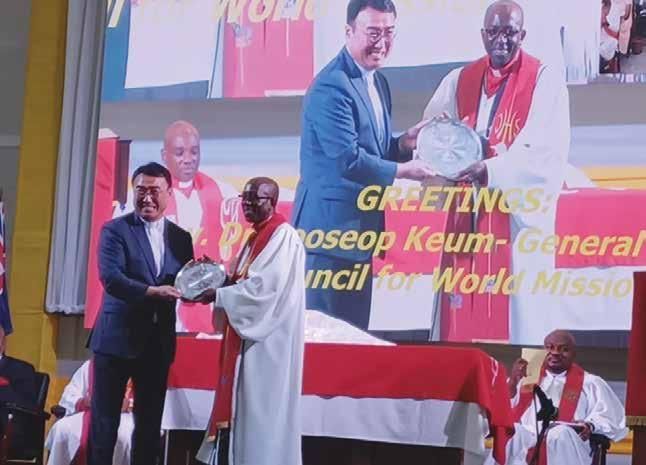
The United Church in Jamaica and the Cayman Islands (UCJCI) celebrated her 2024 Convocation on 5 May in Montego Bay Convention Centre. The event, themed “Rooted, Resilient: Re-ignited by the Spirit,” was marked by a large turnout of 8,000 people, most of whom were adorned in varying shades of red.
The Convocation was an especially significant event for the church as it marked the first time in six years that it was able host large gatherings.
Rev. Glenroy Clarke, minister of the Lucea United Church, preached to a packed convention hall filled with hearts eager to be touched by the words of God.
Rev. Dr Jooseop Keum, General Secretary of the Council for World Mission (CWM), was specially invited by Rev. Norbert Stephens, General Secretary of the UCJCI, to grace the event as the guest of honour and to bring CWM’s greetings to the congregation.
Keum highlighted the close relationship between UCJCI and CWM as part of the global ecumenical family with a common purpose to realise God’s vision for the world. He also acknowledged the Caribbean and North America Council for Mission and International University of the Caribbean members who were present as CWM’s steadfast partners in the collective missional journey.



Addressing the event’s theme, Keum emphasised the profound importance of being rooted in God and allowing the Holy Spirit to transform and forge in believers a sense of spiritual resilience in their lives and in mission.
This is especially crucial in a world that is increasingly volatile in the face of financial crises, pandemics, climate disasters, rising levels of injustices and inequalities, geopolitical turmoil, wars and rumours of more wars to come.
“The Caribbean region, especially, has been facing numerous sociopolitical and economic challenges impacting the development and stability of the communities,” Keum pointed out.
“Amidst these numerous challenges that we are facing today, both globally and locally, it is important to be rooted in the values and teachings of Jesus Christ,” said Keum, who further added that a rootedness that is biblically-grounded is foundational for Christian mission and witness.
Keum also exhorted the audience to extend their Christian witness to local communities and engage in deep relationships with one another and with God.
Using the point of being rooted in the local communities, Keum segued into the upcoming CWM Assembly where he highlighted the importance of the event as one that gathers the global churches in mission to not only worship, fellowship, and network with one another but also explore God’s mission in today’s world and the role of CWM in doing God’s mission.
“May God may use this Assembly as a transformative event in the life and mission of CWM, igniting a fire within us, renewing our spirits and empowering us to make a difference in our communities and the world.”
Besides attending the UCJCI Convocation, Keum’s 5-day visit to the Caribbean region from 1-6 May also saw the CWM leader paying visits to notable local dignitaries such as the President of the International University of the Caribbean, Rev. Dr Roderick Hewitt; Rev. Newton Dixon, General Secretary of the Jamaica Council of Churches; and former CWM General Secretary, Rev. Dr Collin Cowan.
CWM Moderator Easter Message 2024:

Dear sisters and brothers in Christ Jesus, Greetings of love and peace from the Council for World Mission!
I am pleased to reach out to you again this Easter as we celebrate the resurrection of Christ. In John 11:25&26, Jesus asked Martha a question, saying, “I am the resurrection and the life. Those who believe in me, even though they die, will live, and everyone who lives and believes in me will never die. Do you believe this?” As the world we live in today is faced with numerous life-threatening forces, it is hard to respond to the question about life and resurrection.
The ongoing military conflicts, climate crises, socio-economic disparities and growing sense of hopelessness and despair are completely changing the way how we look at life today. Every day, we read or watch the news of death, destruction, and exploitation from every corner of the world. It is in this context of the world that we are reminded of the resurrection of Christ and called to respond to the question of life, resurrection, and faith through our celebration of Easter.
Indeed, it is humanly hard to believe in life amidst the death-dealing forces surrounding societies and threatening lives. However, the story of Jesus


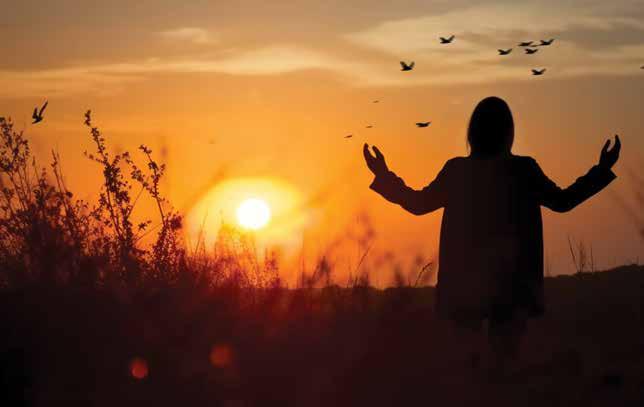
rising from the dead is more than a mere miracle. It is a profound lesson in resilience, hope, and the possibility of new life. It teaches us that even in the midst of despair and hopelessness, there is always hope for redemption and renewal. It is the source of transforming power.
The resurrection of Jesus calls us to recognise that true liberation and renewal come not from worldly powers or material wealth but from a deeper spiritual awakening and connection to God in faith. It profoundly proclaims the enduring power of hope and faith amidst adversity.
The resurrection of Jesus is a clear confrontation of the life-threatening forces and a proclamation of victory that the death-dealing systems cannot hold us captive forever. It calls us to confront the challenges of our time with courage and conviction, knowing that even in the midst of darkness, there is the promise of light and life everlasting. We are, therefore, called to confront systems of injustice, reject the cycle of violence, and instead embrace life.
In John 10:10, Jesus says, “The thief comes only to steal and kill and destroy. I came that they may
have life and have it abundantly.” As a global CWM family, we embraced this as our vision and committed ourselves to transforming our communities into lifeflourishing communities.
During the Assembly this year, the CWM, as a lifeflourishing community, will come together and discern God’s mission under the theme, “Rise to Life: Together in Transformation.”
Therefore, as we rise to life with Jesus, we are called to transform the power structures of our society with the power of the risen Lord. We are called to revision our mission to confront the life-threatening forces that surround us with courage and faith. And, we are called to build life-flourishing communities by being the agents of transformation, by proclaiming the message of hope and healing and by celebrating life together.
May the transforming power of the risen Lord be with you all.
Happy Easter!!!
The Council for World Mission (CWM) Board of Directors held its final meeting via videoconference from 23-24 May before the CWM General Assembly that will see the election of a new Board for the next quadrennial.
CWM Moderator, Rt Rev. Lydia Neshangwe opened the meeting with a reflection and prayer after which the agenda for the meeting was adopted and the minutes of the previous meeting in the Solomon Islands approved.
CWM General Secretary, Rev. Dr Jooseop Keum, shared with the Board the latest Assembly Programme that was well received by the Directors. The Assembly, scheduled to take place from 12-19 June, will draw more than 200 participants for prayers, Bible studies, workshops, cultural exchange events, and mission exposure trips.
The Board also received and approved the Audited Financial Statements for FY2023 from the CWM Treasurer and Mission Secretary – Finance. The statements will be slated for adoption at the next Annual Members Meeting on 12 June in Durban before the CWM General Assembly.
CWM Deputy General Secretary, Dr Sudipta Singh, presented to the Board the report from the Programme Reference Group detailing key milestones achieved by the various CWM programmes as well as giving a brief update on all the regional Pre-Assemblies that took place in preparation for the CWM Assembly.
The Board was presented with a concise recap of the progress made in the mission programme and partnership areas.
Several updates well received by the Board include the recruitment of two new Partners-In-Mission (PIM)

along with six new PIM requests. Currently there are 20 mission partners serving in the PIM programme working in different areas across four regions.
The Board was also updated on the conclusion of the search for suitable candidates to participate in the CWM Youth Internship Programme. The programme offers individuals ages 21-30 a unique mission opportunity to work with CWM’s multidisciplinary teams and departments for a period of 6-12 months. The programme has appointed two new interns to be stationed in the CWM Africa and UK offices as well as a youth consultant to be based in the Singapore office.
The Programme Reference Group also reported that planning for Training-in-Mission (TIM) 2024 is in progress. The first segment of TIM2024 is expected to begin online, followed by in-person learning sessions at UTC in the Philippines and IUC in Jamaica.
The next A New Face programme module is scheduled for the second half of 2024 in the UK, with expected participation from local member churches.
Closing and next board meeting date
The Board meeting was closed with a prayer by CWM Moderator, Rt Rev. Neshangwe.
The next Board meeting will be convened in-person at the end of the CWM Assembly on 19 June in Durban with the election of new Directors and appointment holders.


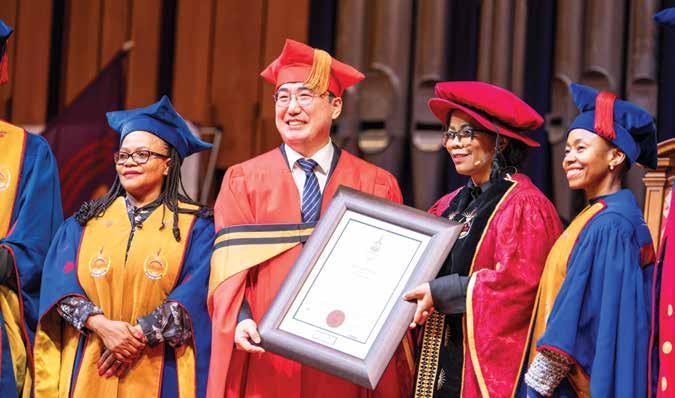
The General Secretary of the Council for World Mission, Rev. Dr Jooseop Keum, was conferred a honorary doctorate in philosophy by the University of South Africa in recognition of his contributions in various missiological fields that have made an indelible impact on the study of mission and theology; his unwavering championing of justice and human rights; and his outspoken, formidable advocacy for transforming Christian discipleship in ways that shape the contemporary world and empower youth and women.
The conferment ceremony took place on 31 May at the Winnie Madikizela-Mandela Building located at the university’s main campus in Muckleneuk, Pretoria, South Africa.
In his acceptance speech, Keum highlighted the educational work of the University of South
Africa for the last 150 years as highly prophetic and transformative in promoting justice, liberation, human dignity, and democracy in Southern Africa.
However, Keum also noted that despite the glowing track record of the institution in producing stalwart leaders such as Albert Luthuli, Nelson Mandela, Oliver Tambo, Desmond Tutu, and Thabo Mbeki, the work in moulding future African luminaries will prove challenging in the face of a radically changing global landscape.
“Today, we live in a time of deep crisis. Environmental damage, economic injustice, military conflicts, and social and political polarisations threaten our existence,” described Keum. “The economic, political, and social systems are broken, leading to division, inequality, and injustice.”
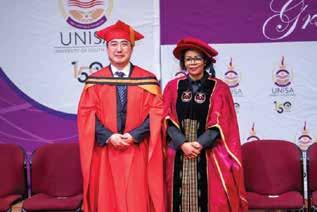
However, despite the difficult global circumstances, Keum maintained that there has never been a better time for the Africa region as it stands poised to rise and be counted.
There are three major advantages, according to Keum, that the region has that will propel it to be a leading global voice in justice, peace, and the enabling of life-flourishing communities.
First, Africa has the youngest population in the world, with a large proportion under the age of 30. Keum highlighted that having such a large population of youth gives Africa the opportunity to grow exponentially.
This is key to achieving the University of South Africa’s vision “towards the African university shaping futures in the service of humanity” with the caveat that the new African generation be fully empowered to realise their best potential through the collective efforts of African educational institutions and churches as well as missional and ecumenical organisations.
Second is the observable shift in the centre of gravity within Christianity towards Africa, away from the West.
“This shift is not merely geographical but symbolises a profound spiritual movement that
recognises the vibrancy, resilience, and deep faith of the African people,” declared Keum.
Keum believes Africa is emerging as a spiritual powerhouse. However, Keum cautioned against merely stopping with the spiritual, and urged working towards shifting the centre of intellectual gravity to Africa in fields including modern technology, medicine, and science.
Third, Africa has been a leader in liberation theology. Its leadership in this area is undisputed due to its unique context marked and grounded by a history of colonisation, oppression, and the unrelenting fight for independence.
This puts Africa in a position to be the voice that resonates with “the collective yearning for freedom and dignity” and offers an alternative leadership that will reconcile a broken and troubled world.
Keum exhorted the audience to continue to work towards collaboration and unity between global communities in order for life to flourish.
“[I] strongly believe that any journey towards justice, peace, and life cannot be walked alone. It requires the strength of unity, the wisdom of collaboration, and the grace of God’s guiding hand,” said Keum, who declared his will to continue working towards forging and fostering solidarity in higher education between South Africa and South Korea, particularly between the University of South Africa and Yonsei University.
“As I accept this honour with deep humility, I am conscious that it is not merely a reflection of my individual achievements but a recognition of the collective efforts of all those who embraced such costly discipleship and walked this path with us,” said Keum.
“In a world in which injustice and violence seem almost insuperable, where hatred and racism seem to thrive, we are privileged to join in the mission of the prophets, working together towards life, living out the values of the kingdom of God, and engaging in mission from the margins.”



The Council for World Mission (CWM) opened its new office in Johannesburg, South Africa on 30 May. The new space will allow more emphasis on cultivating deeper community engagement and driving impactful programs across the region while bolstering CWM’s presence and operational capacity in Africa.
The opening, officiated by CWM General Secretary Rev. Dr Jooseop Keum, CWM Mission Secretary –General Secretariat Rev. Dileep Kandula, and CWM Mission Secretary – Ecology and Economy Rev. Daimon Mkandawire, marks a pivotal moment in the organisation’s history.
The new office will play a significant role in CWM’s strategic expansion into the Africa region, extending its missiological work to positively impact the continent and establish life-flourishing communities.
Together with the other offices based in London and Singapore, the new office in Johannesburg will serve as a central hub for coordinating initiatives, fostering partnerships, and driving CWM’s regional objectives forward.
During a ribbon-cutting ceremony, Keum reflected on Haggai 2:1-9, drawing parallels between the opening of the new CWM South Africa office to the rebuilding of the Jewish temple.
“The opening of this office symbolizes our commitment to the African region and our dedication to advancing our mission’s goals. Just as Haggai 2:19 speaks of the promise of greater glory in the new temple, we believe this new office will be a beacon of hope and a centre for transformative action,” declared Keum.
Mkandawire, who will be leading the operations in the South Africa office, echoed Keum’s declaration: “This new office will enable us to better serve our communities and work more effectively towards our shared goals. The symbolic act of opening this office mirrors the prophetic vision in Haggai, reminding us that our efforts here are part of a greater divine plan.”
A brief tour of the new office followed the opening, showcasing to guests the various designed interior spaces dedicated to supporting the mission’s activities.

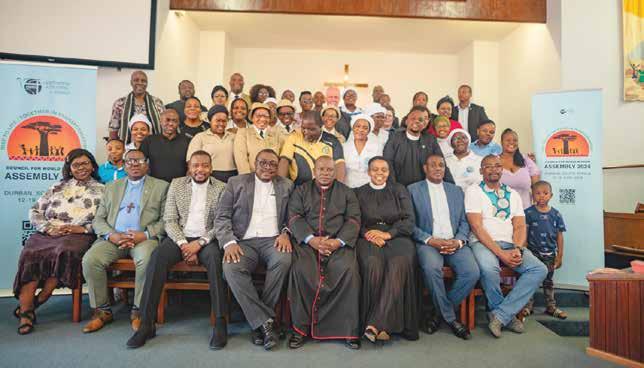
On 1 May, Workers’ Day in South Africa, leaders from the United Congregational Church of Southern Africa (UCCSA) and the Uniting Presbyterian Church in Southern Africa (UPCSA) came together for work, witness, and fellowship.
The gathering, attended by some 100 participants from various organizations and fellowships within the UCCSA and UPCSA, marked an important step towards forming a deeper bond between the sister churches.
This was first of three prayer sessions leading up to the Council for World Mission (CWM) Assembly in June.
Leaders shared their visions and programmes, as well as their reflections on how the Assembly theme, “Rise to Life: Together in Transformation,” encapsulates
the collective aspirations of the churches involved.
The liturgists were two members from the Spiritual Life Group, Rev. Thandi Mwelase and Rev. Thabani Masikane, who led a time of singing. They were joined by the Soldiers of Christ, who added to the harmony with their cymbals.
Rev. Zungu, moderator of the UPCSA in Durban, opened the session with a prayer while Rev. Mthobisi Wellington Sibanda shared the day’s agenda and introduced the members of the Local Organising Committee (LOC).
UCCSA-KZN Regional Chairperson Doc Nhassengo and UPCSA Session Clerk Aaron Nhlabathi offered introductory speeches.
Zimbili Sibisi, Assembly Coordinator, guided the delegates through the Assembly programme.
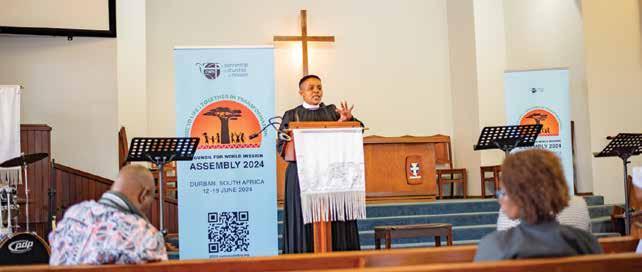
Praying for the hope of revival
Rev. S.R. Sokhela preached a message from Ezekiel 47:10-12, which described rivers of life flowing from the temple, bringing life and healing wherever they go: “Fishermen will stand along the shore; from En Gedi to En Eglaim there will be places for spreading nets. The fish will be of many kinds—like the fish of the Mediterranean Sea. But the swamps and marshes will not become fresh; they will be left for salt. Fruit trees of all kinds will grow on both banks of the river. Their leaves will not wither, nor will their fruit fail. Every month they will bear fruit, because the water from the sanctuary flows to them. Their fruit will serve for food and their leaves for healing.” (Ezekiel 47:10-12, NIV)
Sokhela noted that this passage symbolizes the abundance, restoration, and healing that God brings to His people. In the context of Africa hosting the CWM Assembly in June and facing various challenges, it was as an encouragement for the region to experience a spiritual revival and renewal despite the difficulties it may be facing.
Revival, Sokhela said, refers to a spiritual awakening and renewal within a community or region, often resulting in increased faith, commitment to God, and positive transformation. God uses revivals to bring about positive change by inspiring individuals, communities, and nations to seek Him, pursue justice, and work towards the wellbeing of society.
As Africa faces tough challenges while preparing for elections, the hope of revival can encourage people to engage in the democratic process with integrity, seek wisdom, promote justice, and work towards the betterment of their nations.
Sokhela emphasised the significance of the Assembly in bringing life and transformation to the
African continent, particularly in the face of adversities such as droughts and floods, as well as the tensions associated with the upcoming election season.
A representative from the Independent Electoral Commission was also invited to speak, shedding light on the electoral process, and encouraging prayers for a peaceful and fair election.
The presence of the youth at the session also injected an atmosphere of excitement and hope. The youth members shared plans of holding a joint celebration on 16 June, commemorating the historic youth uprising at the Olive Venue.
LOC members, Ningi Ngcobo and Valmai du Toit, expressed their gratitude for the fruitful prayer session. They emphasised the importance of unity and prayer in bringing about transformation and healing not only within the churches but also in the wider African context.
As the UCCSA and UPCSA prepare to host the CWM Assembly, their commitment to unity, prayer, and collective action continues to shine as a beacon of hope. Through their shared vision and dedication, they aim to bring about transformation and inspire positive change, not only within their congregations but also across Africa.
May the Assembly be a catalyst for life, healing, and renewal, as the churches rise together in transformation, guided by the rivers of hope and faith.
The next joint prayer session will take place at the “Soldiers of Christ Conference” in Inanda Congregational Church.
By Rev. Wellington Mthobisi Sibanda, CWM LOC Convener


The Presbyterian Church in Taiwan (PCT) held its 69th General Assembly from 16-18 April at the Changhua Christian Hospital. The event was attended by almost 600 participants who were warmly received by Pastor Peng Chih-hung, President of the General Council of the Presbyterian Church of Taiwan; Pastor Chen Hsin-liang, General Director of the General Council of the Presbyterian Church of Taiwan; and Chen Mukuan, President of the Presbyterian Church of Taiwan.
Amongst the 38 ecumenical representatives from as many institutions and bodies across 11 countries that attended the General Assembly was the Council for World Mission’s (CWM) Mission Secretary-Mission Programme and Partnership, East and South Asia Region, Rev. Julie Sim who also offered greetings on behalf of the organisation.
Taiwan President-elect Lai Ching-te, was also present at the General Assembly, a key highlight of the event.
In his address to the Assembly delegates, Lai expressed the country’s gratitude to PCT for its assistance rendered to the victims of the recent Hualien earthquake, the most serious geological disaster to hit Taiwan in 25 years.
Lai also highlighted PCT’s contribution to the Taiwanese society, and their support and concern for the government’s various ministries.
“It is a positive development to see Taiwan’s presidentelect participating in the PCT’s 69th General Assembly, which symbolically demonstrates the coexistence and interdependence between the church and the government,” said Sim who also expressed CWM’s continued prayer and solidarity with the people affected by the earthquake and prayers for the Lord to bring the country through this challenging season.

The Council for World Mission’s (CWM) Mission Secretary – Discipleship and Dialogue and the Europe region, Rev. Dr Graham McGeoch, visited the Union of Welsh Independents (UWI) on 12 April in a visit that saw members and staff of the UWI being introduced to the programmes of CWM as well as a quick run-down of the organisation’s history.
Through animated and engaging slides that engaged the audience, McGeoch touched on the history and start of CWM and expanding on his presentation to highlight the issues that have arisen as part of the legacies of historical slavery.
McGeoch also acknowledged that some of the early missionaries had been guilty of introducing British culture alongside the Gospel and that some of the workers of the London Missionary Society (LMS), the forebear of the present CWM, had been involved in slavery.
In addition, McGeoch was also invited as a guest on UWI’s podcast where he introduced CWM’s
missional works, projects, and programmes to the wider UWI community.
“CWM is a grouping of 32 churches across almost all the regions of the world. It used to be called the London Missionary Society. [CWM] now gathers nonconformist, congregational, and reformed churches in many different parts of the world,” explained McGeoch in the podcast, identifying Africa and Asia as the two largest regions in which CWM has member churches.



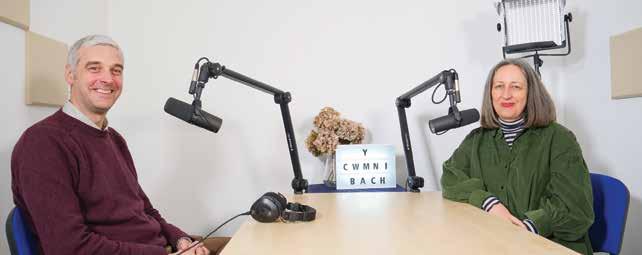
McGeoch went on to describe the early models of Christian mission that were practiced by the LMS that were chiefly about extending colonial influence to the rest of the world through religion or “from the West to the rest”, a model that has since been discarded.
1977 saw a concrete attempt to remodel mission as the end of the Second World War witnessed the independence of many former colonial colonies and with them their local churches that also became autonomous. This had the effect of ending the NorthSouth relationship between the churches in Europe and their peers in the other parts of the world, instead necessitating the formation of partnerships between churches.
McGeoch also illustrated that at the turn of the millennium, partnership evolved into a mutual accompaniment in mission – getting alongside churches in their struggles for justice, dignity, and life.
“CWM’s work today therefore is not about evangelism for conversion but focusing on mission as
an accompaniment of the marginalised in society and how we as churches can come alongside them in their struggles.”
McGeoch also focused on a key area that is constantly on CWM’s agenda, and that is the flourishing of life everywhere in the world. “No church is too small to contribute to that vision,” said McGeoch.
He drew on the example of churches in a large country like India that are resisting waves of persecution and intolerance still persevering through their witnesses to the gospel despite being small.
“Many of CWM’s member churches are very small but they make significant contributions to the life of their countries, societies, and their peoples,” added McGeoch who concluded that through CWM’s partnership with its member churches, smaller churches are given the opportunity to learn and share experiences with their contemporaries and come together as they face similar dilemmas, questions, and struggles.



Ameeting of three international mission agencies: United Evangelical Mission (UEM), Council for World Mission (CWM) and Community of Churches in Mission (CEVAA) took place in London, UK, with CWM as the host from April 23-24, 2024.
This meeting was to be an exchange of working experiences from the three General Secretaries of the mission agencies, namely Rev. Claudia Schulz (CEVAA), Rev. Dr Jooseup Keum (CWM) and Rev. Dr Andar Parlindungan (UEM).
Resource persons from the three mission agencies were also invited. They were Rev. Volker Dally (former UEM General Secretary), Prof. Leepo Modise and Ridho Simamora (UEM), Rev. Dr Pascal Bataringaya (CEVAA) and Rev. Dr Roderick Hewitt (CWM).
During the meeting, the General Secretaries discussed selected cooperation in the fields of mission and ecumenism.
Among the intended programs are
• the strengthening of a mission and ecumenical training institution,
• a shared mission conference,
• programs related to the decolonizing of mission in cooperation with the other ecumenical movements and
• strengthening the role of youth and contributing to climate justice.
One of the themes discussed was to reawaken and relate the role of mission that successfully gave birth to churches in the southern hemisphere from the 19 to 20th centuries in responding to the challenges of the global disasters.
The word “Mission” is often criticized in Europe, although in most of the southern hemisphere, the role of European missionaries is appreciated in liberating local communities and introducing health as well as education as a manifestation of the liberating gospel of Jesus Christ.

After the Conference, Rev. Dr Andar Parlindungan states: “God’s mission to the churches in the global south is the real work of God and bears fruit with the birth of the new churches. Without God´s Mission, the ecumenical movement and the global churches will never exist.
The task of the Church today is to discern the values of Missio Dei, so that the Church becomes more relevant
in creating justice, peace and the integrity of creation for our world community.”
This story was first published by the United Evangelical Mission (UEM): https://www.vemission.org/ en/details/drei-organisationen-eine-mission



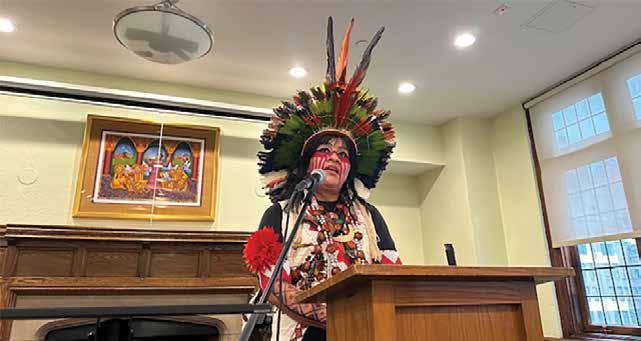
Since 2010, the World Communion of Reformed Churches (WCRC) has made commitments to indigenous peoples that have not been realized.
A significant step toward rectifying this situation was made at a consultation of indigenous members of the Communion and ecumenical partners in late April meeting under the theme, “Repentance, Reconciliation, and Redistributive Justice: Indigenous People’s Spirituality and Theology.”
“The consultation recognized the urgency of the situation facing indigenous people,” said Philip Vinod Peacock, WCRC executive secretary for justice and witness.
“In many parts of the world indigenous people are being killed while in other communities they are being systematically destroyed. Global and ecumenical attention to the cause of indigenous people is central to our commitment to justice.”
Those gathered drafted a paper to be presented to the 2025 General Council. A “request to dialogue,” the paper addresses several important topics and includes proposals for meaningful progress.
“Colonialist thought persists in Indigenous and nonindigenous forms of governance and decision-making; its reach is profound and tenacious. All people–both inside and outside the Church–have been profoundly shaped by colonisation, and it is up to all of us to decolonise and seek our collective liberation,” states the draft paper.
“Therefore, the indigenous peoples that have gathered together in preparation for this General Council are not submitting a position paper, so much as a request to dialogue. The WCRC and many of its member churches and other ecumenical bodies have affirmed time and again the specific and unique plight of indigenous justice concerns across the globe, but indigenous experience, leadership, gatherings, and ministries are never fully funded and always treated as ad hoc projects,” it says.
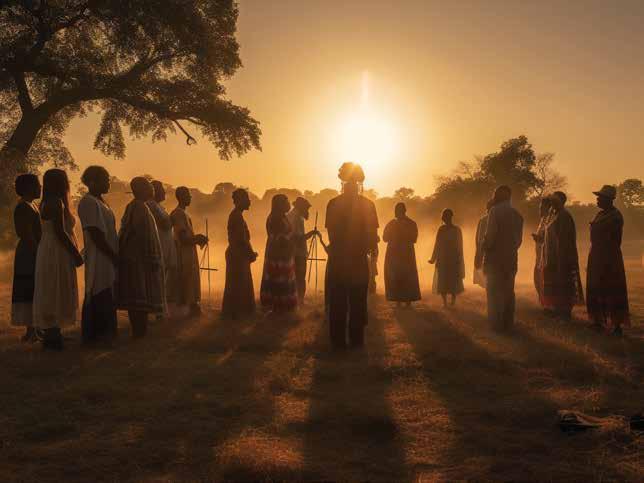
“The churches need to commit to fostering respect for all the responses indigenous peoples have to the challenge of balancing Christianity and indigenous ways of being. The churches also need to commit to opening their archives and resources to indigenous peoples who are seeking to rebuild their expressions of faith and recover their ancestors’ stories.”
“…indigenous people also continue to be the defenders of the land–standing up to corporate and governmental interests. Holding governments accountable to uphold the UN Declaration on the Rights of Indigenous Peoples, and international and domestic environmental regulations and laws. The world has an opportunity, and the Church has a moral
obligation, to actively participate in learning from indigenous peoples defending their lands.”
Participants at the consultation are continuing to refine the draft which will be presented for discussion and action at the 27th General Council, to be held in Chiang Mai, Thailand, 14-23 October 2025.
This article is abridged and reproduced. Visit https:// wcrc.ch/news/indigenous-consultation-issues-requestto-dialogue for the full story.




The DARE Book, “Indecent and Indignant: Theologies, Pedagogies and Praxes of Liberation in Latin America” was launched at the International Book Fair in Bogota, Colombia on 27 April. Published in Spanish, the book features chapters authored by previous DARE participants!
The book covers major themes in Liberation Theology as a movement, including elements such as socialism, marxism, colonialism, human rights, civil society, church, militarism, education, ecology, indigeneity, womanism, queer theology and theory, the bible, decoloniality (including anticoloniality and postcoloniality).
“Indecent and Indignant: Theologies, Pedagogies and Praxes of Liberation in Latin America” deftly mixes testimonies gleaned from community work alongside
contributions from major contemporary Marxists and Liberation Theologians.
The book will also be presented in Paris, France in early June 2024 at a meeting between Christians and Marxists (an initiative of the Vatican and Pope Francis).
